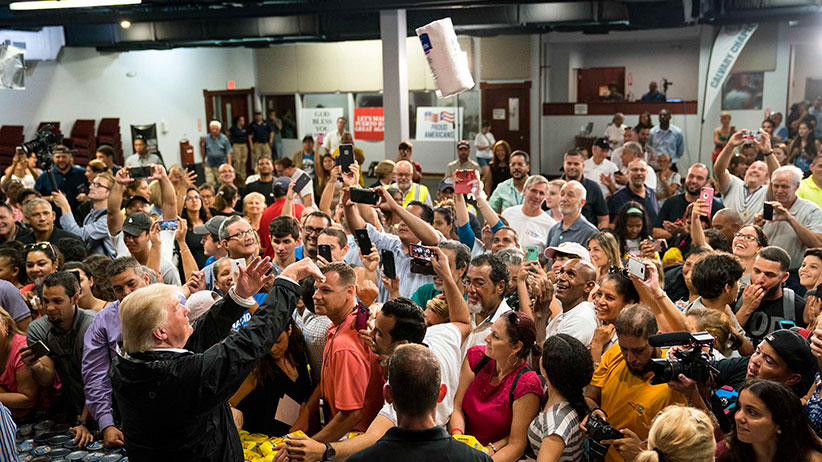Searching for sincerity in the spectacle of Trump
Donald Trump goes to Puerto Rico for his latest fan experience expo
President Donald Trump throws out supplies to people impacted by Hurricane Maria at Calvary Chapel in Guaynabo, Puerto Rico, Oct. 3, 2017. Trump on Tuesday told officials in Puerto Rico that they should be proud that only 16 people died in Hurricane Maria, compared with the “thousands” killed in “a real catastrophe like Hurricane Katrina.” (Doug Mills/The New York Times/Redux Pictures)
Share

Back in May, 2016, just as Trump’s presidential candidacy was looking like it might be legitimate, an op-ed in the New York Times asked, “Is everything wrestling?” Wrestling, Jeremy Gordon wrote at the time, “may never be cool, but it is, at the very least, no longer seen as the exclusive province of the unwashed hoi poloi. This is partly because the rest of the world has caught up to wrestling ethos.”
Wrestling simultaneously wants its audience to believe in the stories it presents while also knowing that it’s all just an artificial construct designed for business and entertainment.
“Parsing both those layers—the behaviour and the meta-behaviour, the story told and the story of why it’s being told that way—can be an entertainment in its own right, and speculating on creative decisions has long been a fascination for wrestling fans,” Gordon wrote, arguing that this approach has now been borrowed by everyone from pop stars to corporate brands. We are welcomed to see things from both sides and are thus more convinced of the product’s authenticity.
This is what remains appealing about Trump, even for those who cannot stand his personality or his politics. Unlike any other politician in modern memory, Trump is capable of manufactured authenticity through dramatic plot twists that we, the audience, know to be fabrications of his own making, but are nonetheless drawn to. We watch, fascinated, but equally flattered by the idea that we know the real game that is afoot, deconstructing the marketing strategy as we go.
Why didn’t Trump talk about Puerto Rico for five days after Hurricane Maria, a Category 4 storm, slammed into the island? Why did he stay silent for so long, even as the devastation became apparent? Why did he choose instead to concentrate on the NFL player protests and disinviting NBA champion Steph Curry from the White House? And why, when he finally returned to the subject of Puerto Rico on his Twitter feed, did Trump then get into a verbal fight with the mayor of San Juan, Carmen Yulin Cruz—a low-level public servant who just needed help?
What part of Trump’s presidency is spectacle? What part is sincere? Does it matter if in the end we are left entertained?
At one point during his visit Monday, Trump stood behind a table of vital supplies—things the people of Puerto Rico might need to get through the coming days and weeks as they try to avoid complete disaster. A crowd of people formed in front of him. Most people held their phones aloft, trying to get a picture of the president, the celebrity showman they know from TV. Rather than hand out the supplies, Trump did what anyone versed in the world that wrestling created might do: he worked the crowd, choosing to instead toss rolls of paper towel into the mob like a mascot firing t-shirts into the stands at intermission. The casual disinterest with which Trump has approached the unfolding catastrophe in Puerto Rico was overshadowed, if not forgotten, in the moment. What mattered was that he was there in person, hosting the latest road stop of the Trump Presidency Fan Experience.
After handing over some canned food to extended hands, Trump turned to the cameras behind him. “There’s a lot of love in this room, there’s a lot of love in this room,” he said, smiling. “Great people.”
It didn’t really matter if he actually meant it.